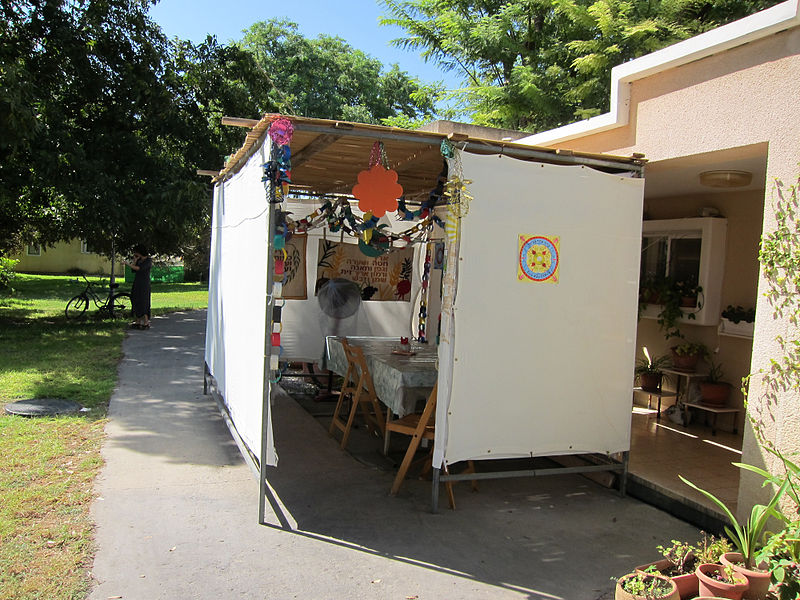
Sukkah
…you are to celebrate it as pilgrimage, a pilgrimage-festival to the Eternal One , for seven days a year – a law for the ages, throughout your generations: in the seventh New-Moon you are to celebrate it as pilgrimage – in huts you are to stay for seven days, every native in Yisrael is to stay in huts – in order that you generations may know that in huts I had B’nei Yisrael stay when I brought them out of Mitzrayim, I am the Eternal One your God! (Vayikra 23:41-43)1
The argument for the “Oral Law” is that the Yisraelites would not know how to properly build a sukkah as required in the Torah. However, since there is no actual description of the sukkah in the text of the Torah there must be reliance upon the fact that the Yisraelites were already living in sukkot during the time the Torah was given. Therefore, what a sukkah was and how it was to be built was already known to the Yisraelites during the exodus from Egypt. We see further evidence from the Tanakh as to how the sukkah is to be built.
You are to take yourselves, on the first day, the fruit of beautiful trees, branches of palms, and boughs of thick tree-foliage, and willows of the brook. And you are to rejoice before the presence of the Eternal One your God for seven days… (Vayikra 23:40)1
We see from this verse that the Yisraelites are told to take the fruit of beautiful trees, palm-tree branches, boughs of thick trees, and willows of the brook on the first day of the holiday. However it does not say what to do with these four species but that is answered in Nechemiah.
They found written in the Torah that the Eternal One had commanded through the hand of Moshe that B’nei Yisrael should dwell in succos during the festival [that is] in the seventh month. [They commanded] that they should announce it and make a proclamation in all their cities and in Yerushalayim, saying, “Go out to the mountain and get [branches with] olive leaves, pine needles, myrtle leaves, palm leaves and leaves of the braided tree, to make succos, as written [in the Torah].” So the people went out and brought [these items] and made themselves succos, each man on his roof, and in their courtyards, in the courtyards of the Beit HaMikdash of God, in the plaza of the Water Gate and in the plaza of the Gate of Ephraim. (Nechemiah 8:14-16)2
We see very clearly that these four species were to be used not as a lulav and etrog but simply to make the actual sukkah.
Punishment
But if harm should occur, then you are to give life in place of life – eye in place of eye, tooth in place of tooth, hand in place of hand, foot in place of foot, burnt-scar in place of burnt-scar, wound in place of wound, bruise in place of bruise. (Shemot 21:23-25)1
The argument for the “Oral Law” is that if there was no “Oral Law” then this passage must be taken literally. However, there is only one act that calls for a “life in place of life” that is to be taken literally.
Now a man – when he strikes down any human life, he is to be put to death, yes, death! (Vayikra 24:17)1
In all other instances, the idea of a life for a life tooth for a tooth, etc. is taken as a metaphorical statement regarding payment for certain actions. We clearly see this in the verse next verse.
One who strikes the life of an animal is to pay for it, life in place of life. (Vayikra 24:18)1
We are clearly told that a murderer is not to be ransomed for money in place of the death penalty.
You are not to accept a ransom [כֹּפֶר] for the life of a murderer, since he is culpable, (deserving) the death-penalty, indeed, he is to be put to death, put to death! (Bamidbar 35:31)1
Since murder is the only instance where a ransom is not permitted, it indicates that under other circumstances a ransom – monetary payment – is in fact permitted. We can see this in the relation of a master and slave.
When a man strikes the eye of his serf or the eye of his handmaid, and ruins it, he is to send him free at liberty for (the sake of) his eye; if the tooth of his serf or the tooth of his handmaid he breaks off, he is to send him free at liberty for (the sake of) his tooth. (Shemot 21:26-27)1
One final passage will completely clarify and prove that this passage is to be taken metaphorically and not in the literal sense.
When an ox gores a man or a woman, so that one dies, the ox is to be stoned, yes, stoned, and its flesh is not to be eaten, and the owner of the ox is to be clear. But if the ox was (known as) a gorer from yesterday and the day-before, and it was so designated to its owner, and he did not guard it, and it causes the death of a man or of a woman, the ox is to be stoned, and its owner as well is to be put to death. If a ransom [כֹּפֶר] is established for him, he is to give it as a redemption for his life, all that is imposed for him. (Shemot 21:28-30)1
It is quite clear from the Tanakh that this passage is to be taken metaphorically (with the exception of murder) and not literally. Therefore, there is no need for an “Oral Law” to explain this particular passage.
———————-
1Everett Fox. The Five Books of Moses. New York: Schocken Books, 1997.
2Nosson Scherman, ed. The Stone Edition Tanakh. New York: Mesorah Publications, Ltd., 2007.
